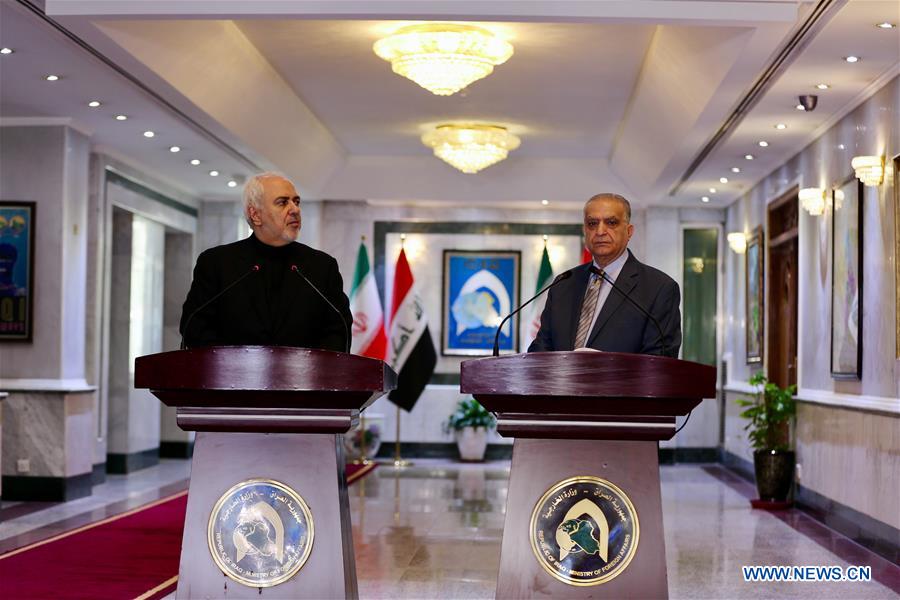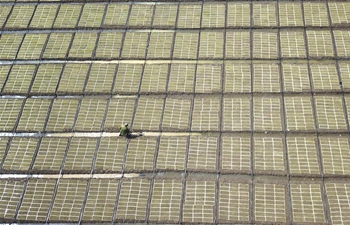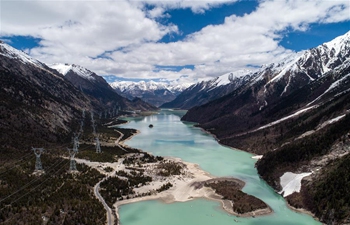
Iraqi Foreign Minister Mohammed al-Hakim (R) and his Iranian counterpart Mohammad Jawad Zarif attend a joint press conference in Baghdad, Iraq, May 26, 2019. Iraq said on Sunday that it opposes sanctions imposed by the United States on Iran and proposed to mediate if asked. "We stand with our neighbor Iran and we affirm that the economic blockade is useless and causes great suffering to the Iranian people. Therefore, we stand against this blockade," said Iraqi Foreign Minister Mohammed al-Hakim at a joint press conference with his Iranian counterpart Mohammad Jawad Zarif who is on an official visit to Iraq. (Xinhua/Khalili Dawood)
BAGHDAD, May 26 (Xinhua) -- Iraq said on Sunday that it opposes sanctions imposed by the United States on Iran and proposed to mediate if asked.
"We stand with our neighbor Iran and we affirm that the economic blockade is useless and causes great suffering to the Iranian people. Therefore, we stand against this blockade," said Iraqi Foreign Minister Mohammed al-Hakim at a joint press conference with his Iranian counterpart Mohammad Jawad Zarif who is on an official visit to Iraq.
"We are always against the unilateral measures by the United States. We stand with our neighbor Iran, and will be an appropriate mediator for the two sides if asked to do so," al-Hakim told reporters.
For his part, Zarif said Iran "has strong desire to establish relations with all countries of the Gulf."
Iran has "presented proposals for cooperation with regional countries, including signing a non-aggression pact with Gulf countries," he added.
A statement by the media office of the Iraqi Speaker of Parliament Mohammed al-Halbousi said al-Halbousi held a meeting with Zarif, in which he confirmed Iraq's intention to "play a pivotal role in reducing the escalation between Tehran and Washington to avoid the risk of escalation in the region."
According to the statement, Zarif said Iran "has no desire in any military escalation, and it is ready to accept any initiative that could help reduce the escalation."
On Saturday afternoon, Zarif arrived in Iraq's capital Baghdad and met with Iraqi Prime Minister Adel Abdul Mahdi and President Barham Salih, discussing bilateral ties and regional situation.
Zarif's visit came amid rising tensions between Washington and Tehran, which came after U.S. President Donald Trump decided not to re-issue the sanctions waivers for major importers to continue buying Iran's oil when they expired in early May.
On May 15, the U.S. State Department ordered the non-emergency U.S. employees working in both the embassy in Baghdad and the consulate in Erbil to leave Iraq, a U.S. embassy statement said.
On May 21, Mahdi said Iraq will send delegations to the United States and Iran to ease the tension in the Middle East.
The United States has also increased its military buildup in the region recently by deploying an aircraft carrier, bombers and anti-missile systems, citing a threat of Iranian attack.















